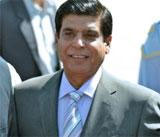
New Delhi, Jun 23: Reaching out to his new counterpart in Pakistan, Prime Minister Manmohan Singh today congratulated Raja Pervez Ashraf and expressed confidence that the two countries will continue to make progress on bilateral issues and build good neighbourly relations during his tenure.
"I would like to extend to you my heartiest congratulations on your appointment as Prime Minister of the Islamic Republic of Pakistan," Singh wrote to Ashraf.
"I am confident that during your term as Prime Minister our two countries will continue to make progress in their bilateral dialogue on all issues and build good neighbourly relations by strengthening their cooperation in all areas for the benefit of the peoples of both countries," the message read.
Singh conveyed to Ashraf that he looked forward to working closely with him.
He expressed best wishes to Ashraf for his success in the new assignment as well as for the peace, prosperity and well-being of the people of Pakistan.
Soon after Ashraf was administered oath as the Prime Minister last night, he said bettering of ties with India would be one of his foreign policy priorities.
He said Pakistan will work to strengthen the dialogue process that is already underway to resolve problems like the Kashmir issue.
Ashraf, a stalwart of the ruling PPP, was administered the oath of office by President Asif Ali Zardari, hours after he was elected as the new Prime Minister by the National Assembly.
The 61-year-old loyalist of the Bhutto family was pitchforked into the hot seat after the original choice Makhdoom Shahabuddin faced an arrest warrant.





Comments
Add new comment